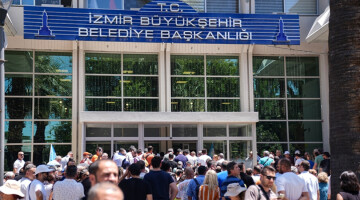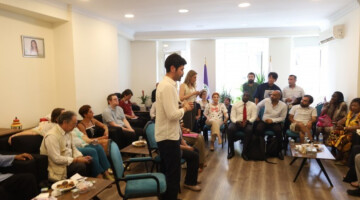The fifth round of constitutional talks for Syria began in Geneva on Monday. Representatives of regime leader Bashar al-Assad, the Turkish-backed "opposition" and civil society are to discuss principles for a new constitution, UN special envoy Geir Pedersen said in Geneva.
After nearly a decade of conflict, this is a very important meeting, Pedersen said. The new round of negotiations in the so-called Small Chamber of the Constitutional Committee is expected to last until Friday, with each group providing 15 delegates. At the end of the process, the Grand Chamber of the Constitutional Committee, with 150 delegates, is expected to approve the draft constitution, according to the Syria special envoy. At the insistence of the Turkish government, one party is not at the table: the Autonomous Administration of North and East Syria. The latter takes the view that such a committee would not be binding without the involvement of the peoples of northern and eastern Syria.
The Committee for a Constitution of Syria emerged as a result of talks between Russia, Turkey, and Iran in Astana and eventually in Sochi. Subsequent meetings of the Constitutional Committee served primarily to delineate individual spheres of interest and broker deals between Russia and Turkey. Beginning in late 2019, the meetings were placed under the auspices of the United Nations. In a 2015 resolution, the UN Security Council had stipulated the formation of a constitutional committee as part of a comprehensive peaceful solution to the Syrian conflict. As expected, the first rounds of talks ended without tangible results.
“German government should withdraw support from format”
The Society for Threatened Peoples (Gesellschaft für bedrohte Völker, GfbV) appealed to the German government on Monday to withdraw its support from the format, saying that political coverage and funding would have to depend on whether representatives of Syrian civil society and ethnic as well as religious minorities were at the table. According to STP, the constitutional committee should negotiate a Syrian constitution for the post-Assad regime and ensure that democracy, human and minority rights, and women's rights are guaranteed in the future Syria.
However, the current constitutional committee consists mainly of men from the Syrian regime and Islamist groups controlled by Turkey," said Dr. Kamal Sido, the STP's Middle East expert, in Göttingen. The committee, however, is completely under the control of Turkey and Russia, who have no interest in implementing the original goals of UN Resolution 2254.
Only a minimal consensus
In the minimal consensus unanimously adopted on December 18, 2015, the UN "expresses its support for an UN-moderated Syrian-led political process to establish a credible, inclusive, and secular system of government within six months and to establish a process, including a timetable, for the drafting of a new constitution, and further expresses its support for free and fair elections under the new constitution within 18 months under the supervision of the United Nations." Since the UN Security Council resolution is the only unanimous decision, all local and international forces that have been active in the Syrian field so far are trying to emphasize their legitimacy by referring to this decision.
RELATED NEWS:












